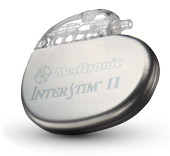Most people feel more than a bit uneasy when they consider talking to their friends, family, and doctor about bowel incontinence. If you suffer from the inability to control your bowel movements, you are not alone. This condition affects millions of people. According to the National Institute of Health, more than 18 million Americans suffer from fecal incontinence.
The physicians at CARI take a special interest in fecal incontinence and have brought leading edge treatments to their patients of the Lehigh Valley. Our physicians offer minimally invasive techniques (like InterStim® Therapy) and office-based injection therapy (like Solesta®) to help their patients find relief from the loss of bowel control. CARI’s own Dr. Indru Khubchandani is the Lehigh Valley’s only physician to perform Solesta Injection Therapy for fecal incontinence, while Dr. David Bub is one of the area’s preeminent providers of InterStim® Therapy.
Bowel incontinence, also known as fecal incontinence (FI), prevents you from controlling your bowel movements. You may experience unexpected leaks, or use the bathroom very frequently. Some people experience a combination of these symptoms. Some people may suffer from bowel incontinence due to not being able to sense a bowel movement, while others are able to sense a bowel movement but cannot hold it until they get to a bathroom.
What are the Causes and Conservative Treatments of Fecal Incontinence? CLICK HERE
The surgeons at CARI offer neuromodulation to patients who have not had success with more conservative treatments. InterStim® Therapy (SNS) is an FDA-approved neurostimulation therapy that targets the communication problem between the brain and the nerves that control bowel function. If those nerves are not communicating correctly, the bowel muscles may not function properly and may cause bowel control problems.

CARI surgeon, Dr. David Bub has performed countless InterStim placements on his patients and chooses it as a primary treatment for patients with fecal incontinence. Over 70% of patients have experienced excellent results, with some even obtaining perfect control after the procedure. Neurostimulation can eliminate or reduce your symptoms to a tolerable level and allow you to resume your daily activities and “get your life back”.

InterStim® Therapy is designed to minimize the symptoms of bowel incontinence, including the leakage of liquid or solid stools. Prior to undergoing a permanent implantation of the neurostimulation device patients undergo a trial assessment. This lets you try neurostimulation to see if it is right for you without making a long-term commitment. The trial assessment may take a few to several days to complete.